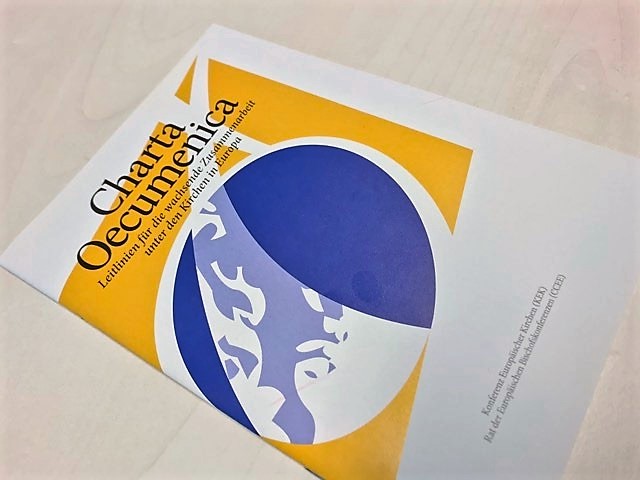Promoting Reconciliation
Wethen, 22 April 2021. The commitments of the Charta Oecumenica, signed by the European churches today 20 years ago, are also a challenge for Church and Peace. Chair Antje Heider-Rottwilm reflects.
In recent months, I often have found myself thinking about the future, and Strasbourg. Will it be possible for us, the Church and Peace network, to finally meet again for our annual international conference — in Strasbourg, in September — to actually meet in person, face to face?
And in recent months, my thoughts often have taken me back to Strasbourg, where, 20 years ago, in April 2001, the Presidents of the Conference of European Churches and the Council of European Catholic Bishops’ Conferences signed the Charta Oecumenica.
This is what the Charter was all about: Europe — from the Atlantic to the Urals, from the North Cape to the Mediterranean — is today more pluralist in culture than ever before. With the Gospel, we want to stand up for the dignity of the human person created in God’s image and, as churches together, contribute towards reconciling peoples and cultures.
Since the European Ecumenical Assembly in Graz in 1997, various drafts had been the subject of intensive discussion in the churches throughout Europe. And now, young and old, women and men from all over Europe had come together to celebrate the signing of the Charter with their prayers and their hopes for the future, and then to go on their way with a commitment to bringing the Charter to life.
‘Blessed are the peacemakers, for they will be called children of God’ (Mt 5:9), is the verse at the top of the third section of the Charter, ‘Our Common Responsibility in Europe’.
The commitments of the churches are clear and unmistakable: We commit ourselves to work for structures of peace, based on the non-violent resolution of conflicts. We condemn any form of violence against the human person, particularly against women and children.
Reconciliation involves promoting social justice within and among all peoples; above all, this means closing the gap between rich and poor and overcoming unemployment. Together we will do our part towards giving migrants, refugees and asylum-seekers a humane reception in Europe. (III.8)
We find ourselves challenged again and again by the commitments of the Charta Oecumenica — we as the Church and Peace network, and also the churches, with whom we struggle together to follow the Way as disciples of Jesus and, as we do so, unambiguously affirm the nonviolent transformation of conflict and the renunciation of all military options.
Again and again we are made aware of the fact that in this Europe ‘from the Atlantic to the Urals, from the North Cape to the Mediterranean’, human dignity is being violated and that from this Europe, violence is spreading out. During an international Zoom discussion in the autumn, we were reminded of this by Rosá Björk Brynjólfsdóttir, a member of the Parliamentary Assembly of the Council of Europe and Vice Chairperson of the Assembly’s Committee on Migration, Refugees, and Displaced Persons (see page 6).
In press releases and joint campaigns with other organizations, and with the support of alliances for action such as United4Rescue, we continue to advocate that ‘migrants, refugees, and asylum-seekers’ be given ‘a humane reception in Europe’.
We see the connections between racism, power, and sexism as a challenge for peace churches, a challenge which we have begun to face. The experience of our members and friends in Britain and Ireland is especially helpful, and we have benefited from this on several occasions in online discussions organised by the region. This subject will also be discussed at the Strasbourg conference on the theme of ‘Images of God and Nonviolence’.
Last but not least, we are closely following developments in the European Union: are these developments contributing ‘towards reconciling peoples and cultures’? Our statement at the conclusion of a long period of political decision-making regarding the Multiannual Financial Framework (MFF) 2021–2027 makes it clear that we consider the funding of arms research and production from the EU budget to be a disastrous paradigm shift and that other decisions about military options also call the European ’Peace Project’ into question. We are dismayed by Brexit, which was finally cemented by treaty, and are especially concerned about the risk of a new flare-up of the conflict in Northern Ireland after it has been contained with such great difficulty.
We will also continue to work to ensure that the EU strengthens human rights and climate justice and Europe as a peace project, instead of tying human and financial resources up in armaments and military operations.
The Charta Oecumenica ends with a prayer that was valid when it was signed 20 years ago and will continue to be equally valid in future: ‘May the God of hope fill us with all joy and peace in believing, so that we may abound in hope by the power of the Holy Spirit’. (Rom 15:13)
Read the Charta Oecumenica and find out more about its impact at the local level.
Read Church and Peace’s analysis of security policy decisions taken during the German EU Presidency.


